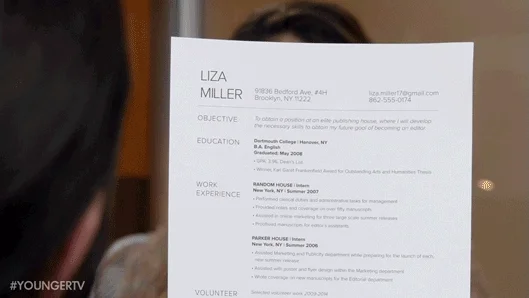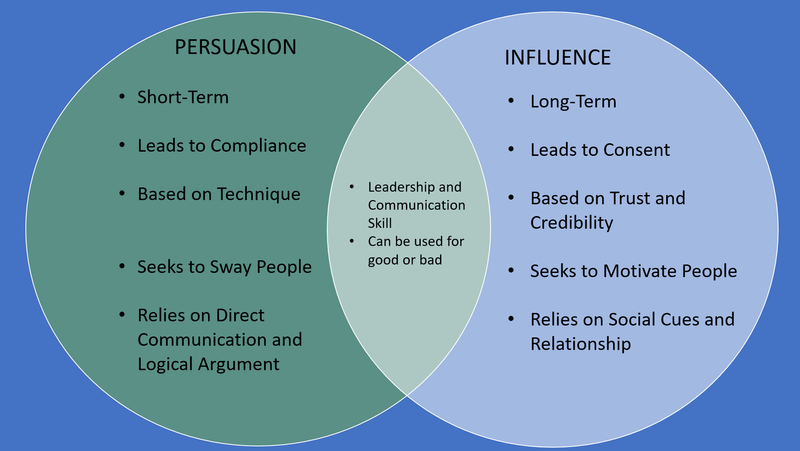"Give an example of a time when you persuaded your co-worker(s) to take a certain course of action. What was the outcome?"
"How do you influence others when you work on a team?"
Hiring managers often ask questions like this in job interviews. They provide a great opportunity to highlight your communication and collaboration skills.

Persuasion and influence seem to be used interchangeably here, but they are different ways to communicate ideas. Understanding the difference can help you in both your professional and personal relationships.
What IS the difference?
Simply put, persuasion is the act of convincing people to take a desired action or "agree with something through reasoning or argumentation." It often "appeals to the emotions, values, and beliefs of the audience."
Influence, on the other hand, involves motivating people to work together toward something without using coercion or argument. Influence is a part of who you are, and may involve your accomplishments, actions, or social status.
 Venn Diagram Persuasion vs. Influence — Created by Author
Venn Diagram Persuasion vs. Influence — Created by Author
To hear an audio description of the diagram above, press play on the audio player below:
While persuasion is often used to achieve a specific goal, influence is a more subtle and long-term process that involvesbuilding relationships and trust over time.
— Shawn Mahaner, CEO of The Content Authority
Both persuasion and influence can be used for ethical or unethical purposes. It's important to be aware of your intentions so that you can persuade or influence others ethically.
Why does it matter?
Persuasion and influence are both skills that you can learn and improve.
Knowing the difference between them can help you:
Effectively communicate your ideas and opinions and increase confidence
Protect yourself from being manipulated by others
Enhance your personal and professional relationships
Increase your leadership potential

When seeking to persuade or influence someone, ask yourself what kind of leader you want to be.

When used with integrity, persuasion techniques can help you move a decision-making process along for the good of a group. When you've earned trust, you'll have greater influence and you'll be better able to positively motivate people.

On the other hand, unethical persuasion techniques can be used to exploit people.
If you haven't earned the trust of others, your influence will be limited.
Quiz: Jack's Presentation

Your coworker Jack feels strongly about supporting working parents and caregivers at your company. He develops a presentation to the board outlining the benefits of a hybrid work model for both employee morale and business success outcomes.
You attend his presentation, which is well-attended and well-prepared.
Which of the following would be most important in influencing stakeholders to accept Jack's proposal?
A. His engaging multimedia presentation and branded slide deck
B. His organization of facts, figures, and supporting data
C. His reputation as a well-liked and conscientious worker who excels at his job
D. His emotional appeal to support workers who are overwhelmed by outside responsibilities
Quiz
Choose the correct answer.
Which to use and when?
Multiple factors can influence whether you want to persuade or influence, such as:
Your goal
Your audience's needs and beahviors
Your relationship with the audience
The medium you use to communicate
Examples

Advertisers use persuasive tactics to get customers to buy a product or service. They may use logical reasoning or appeal to the needs and emotions of the audience.

Parents, children, or siblings often use their influence if they want to motivate a family member to change their behavior. Success will probably depend on the strength of the relationship.

Social media influencers likely use both persuasion to get followers to buy products from their sponsors, andinfluence by giving them someone of status to identify with that they feel they know and trust.
What about power?
You might be asking yourself, how much influence can I have without being in a position of authority? This is an important question, and the answer lies in understanding the difference between power and influence.
"Power is the ability to enact change or control over situations, events, and people." It often comes with position — "official titles or offices that are recognizable to others."

Influence can be invisible, but just as effective. You don't have to have authority to have influence. It is relational and built on trust, reputation, credibility, or even likeability.
Quiz
Which of these are good practice for building influence even if you aren't in a position of authority? Select all that apply:
Tips for Using Persuasion and Influence
Here are four important tips for using persuasion and influence effectively:

Focus on relationship over outcome
If you’re more focused on the outcome of getting people to do something than you are on building relationships, "you might come across as pushy." For short-term transactions, focus on the "WIIFM", or "What’s in it for me?" for your audience.

Become a better communicator
Just by improving your writing or speaking skills, you can become a more persuasive and influential communicator. "Choose your words carefully and tailor your message to your audience" to show the value you offer and build rapport.

Respect personal boundaries
If someone expresses a clear boundary, such as not wanting to participate, trying to persuade them otherwise can damage a relationship.

Respect cultural differences
Always seek to understand and respect "the cultural norms and values of those you are trying to persuade or influence."
Take Action
Understanding the difference between persuasion and influence can help you build your professional career, improve your relationships, and achieve short and long-term goals.

Here are some ways to improve your persuasion and influence skills:
Your feedback matters to us.
This Byte helped me better understand the topic.
